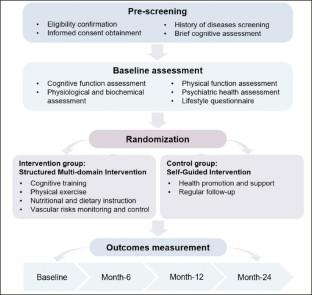The Journal of Prevention of Alzheimer's Disease ( IF 6.4 ) Pub Date : 2024-03-19 , DOI: 10.14283/jpad.2024.59 X. Xu , T. Pang , Y. Zhou , H. Zhang , A. Ma , C. Yuan , H. Chen , X. Wen , Q. Yang , X. Xu

|
Background
The globe has been working to promote a multi-domain lifestyle intervention for dementia prevention in older adults, referring to the Worldwide-FINGERS (Finnish Geriatric Intervention Study to Prevent Cognitive Impairment and Disability) initiative. In China, the multi-domain lifestyle intervention has been implemented in rural communities (MIND-China), yet the adaptability of such intervention based on the urban communities in China has not been verified.
Objective
To examine the effectiveness and feasibility of the multi-domain lifestyle intervention on dementia prevention in at-risk community-dwelling older adults in China.
Design, Setting, Participants
The multi-domain lifestyle intervention study is a community-based 2-year cluster randomized controlled trial (RCT). A total of 1200 participants aged 60–80 years old will be recruited from twelve communities in Hangzhou, Zhejiang. Inclusion criteria were the Montreal Cognitive Assessment 5 minutes protocol (5 min MoCA) score of 6–9 or the Ascertain Dementia 8 (AD 8) score of ≥2, and having modifiable lifestyle factors.
Intervention, Measurements, Results
Participating communities will be randomized into either the structured multi-domain intervention (SMI) arm or the self-guided intervention (SGI, general health education) arm. The SMI consists of cognitive training, physical exercise, and nutritional and dietary instruction for the first 12 months; and vascular risks monitoring and control for 24 months. The primary outcome is the global cognitive performance, measured by the comprehensive Neuropsychological Test Battery (NTB). The secondary outcomes include domain-specific cognitive performances, physical function, mental health, physiological and biochemical indices, adherence to healthy lifestyles, and neuroimaging metrics. The feasibility of intervention will be evaluated around the five dimensions of the RE-AIM framework and in conjunction with quantitative data, operational data and results of focus group discussions.
Conclusions
Following the Worldwide-FINGERS, this cluster RCT will verify the adaptability of the multi-domain lifestyle intervention in the urban community settings in China. This study will add evidence for global dementia prevention and management among older adults.



























 京公网安备 11010802027423号
京公网安备 11010802027423号